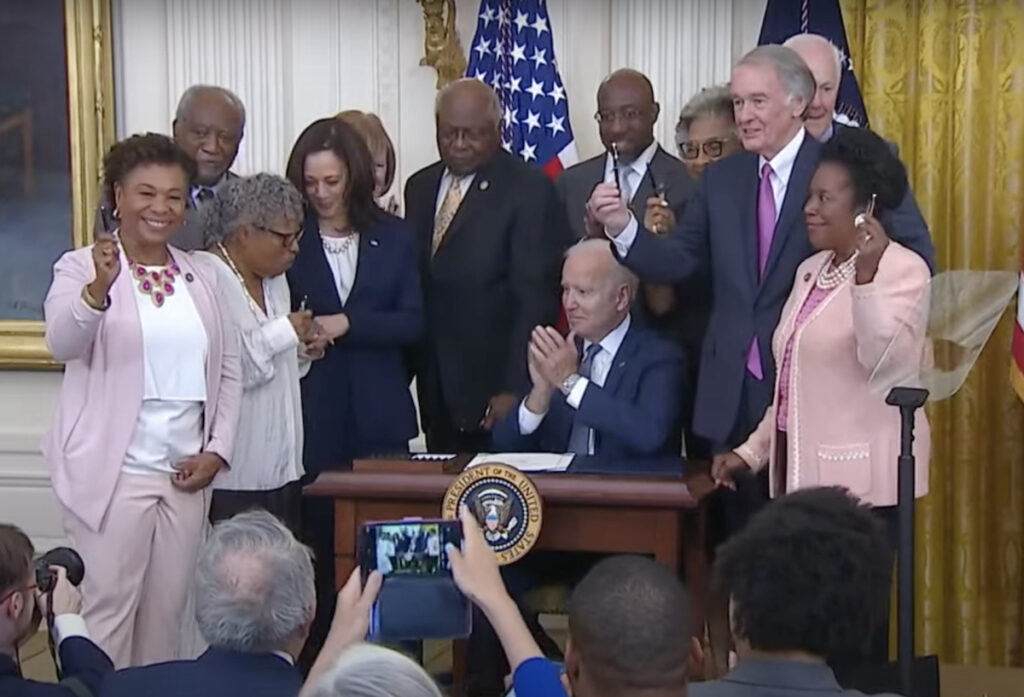Today is indeed a day of Jubilee as the nation recognizes the historical importance of Juneteenth. We can no longer shut the door on the past. We must bring it to light so that the healing can begin…
On Thursday, June 17th, 2021, in the East Room of the White House, President Joseph Biden signed into law Bill S. 475, the “Juneteenth National Independence Day Act,” which designates Juneteenth National Independence Day as a legal public holiday. The bill passed unanimously in the Senate, and by a vote of 415-14 in the House of Representatives. (Today I will not dwell on the 14 Congressmen who voted against the bill.) Present at the ceremony was Ms. Opal Lee, the 94-year-old activist known as the “Grandmother of the Juneteenth movement” to make this historic recognition of Juneteenth a federal holiday. President Biden spoke of how Ms. Lee saw a White mob torch her family’s house when she was 12 years old. This happened on June 19, 1939. Newspaper reports of the time say the burning of her family’s home culminated because “Negroes were celebrating emancipation.” In other words, the mob was angry that Black residents of the town in Texas dared openly rejoice over the end of slavery.
Ms. Opal Lee, a retired educator, made it her life’s mission to see Juneteenth recognized as a national holiday. For her the past wasn’t the past. She continued the cause organized by Dr. Ronald V. Myers and his National Juneteenth Observance Foundation. When she was 90 years old she walked from Texas to Washington DC to bring attention to the cause. And now, on June 17th, at the White House, she was overcome with emotion. She has annually walked two-and-a-half miles to commemorate the two-and-a-half years it took until the announcement of freedom was made in Galveston, Texas. And today, on this finally federally sanctioned holiday of Juneteenth, at age 94, she will once again walk two-and-a-half miles.
President Abraham Lincoln signed the Emancipation Proclamation on January 1st, 1863, but it wasn’t until June 19th, 1865 that the enslaved population in Galveston, Texas was notified of their freedom. This took place approximately ten weeks after the Confederate army under General Robert E. Lee surrendered at Appomattox. Union soldier Major General Gordon Granger along with more than 2,000 soldiers arrived in Galveston to read what was known as General Order No. 3:
“The people of Texas are informed that, in accordance with a proclamation from the Executive of the United States, all slaves are free. This involves an absolute equality of personal rights and rights of property between former masters and slaves, and the connection heretofore existing between them becomes that between employer and hired labor. The freedmen are advised to remain quietly at their present homes and work for wages. They are informed that they will not be allowed to collect at military posts and that they will not be supported in idleness either there or elsewhere.”
The document both proclaims freedom for the enslaved population who did not know about Abraham Lincoln’s orders and foreshadowed the years of struggle to come.
The freedom of African Americans from the bonds of slavery is what the annual holiday commemorates, “Today we consecrate Juneteenth for what it ought to be, what it must be, a national holiday,” Biden said. “We can’t rest until the promise of equality is fulfilled for every one of us, in every corner of this nation. That to me is the meaning of Juneteenth. […] I hope this is the beginning of a change in the way we deal with one another.”
Although Juneteenth 1865 occurred over 150 years ago, I still find myself amazed by the events of this week that ended with the signing of this most significant federal legislation because I did not know how this nation would respond to the remarkable opportunities we have to turn things around at this crossroads. Brandon David Wilson wrote a brilliant essay on the “Great Black Pain Discourse.” Are there too many stories and movies overly focused on Black suffering and trauma? Or do we have to bear witness to the history of slavery and the fight for civil rights in order to right the wrongs. He concludes that our joy and our pain are inextricably linked. We cannot celebrate the joy in a hollow vacuum. And Ms Opal Lee and others have demonstrated that by keeping our eyes firmly on the prize, we shall overcome.
We will soon announce the winners of the No Malice Film Contest, a joint collaboration I sponsored with the Abraham Lincoln Presidential Library Foundation. Youth and young adults in Illinois between the ages of 11-21 submitted short films that illustrate racial healing. Those films are in the process of being rated by a Panel of Judges. It is my hope that we can use this inflection point in history to bring about real change, real healing, real unity. From 94-year-old Ms. Opal Lee, to the young people who took time to make films about racial healing, this connection to the signing of the Emancipation Proclamation and the new Juneteenth Independence Day Act give me hope.
The full footage of the signing ceremony from the White House, courtesy of CNBC, is embedded below.
<span id=”selection-marker-1″ class=”redactor-selection-marker”></span>
Header Image: Courtesy of CNBC’s coverage embedded above.












